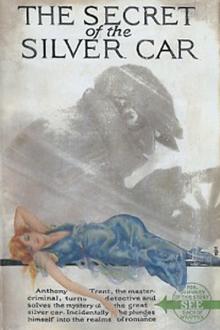The Secret of the Silver Car by Wyndham Martyn (best classic romance novels txt) 📕

- Author: Wyndham Martyn
- Performer: -
Book online «The Secret of the Silver Car by Wyndham Martyn (best classic romance novels txt) 📕». Author Wyndham Martyn
“Yes, yes,” Pauline said, excitement in her voice, “but tell me exactly what to do.”
“Can you motor to this Zencsi farm without being found out?”
“It will not be easy but it shall be done.”
Her air of assurance heartened him.
“You can only find the blasted tree by day light,” he said thoughtfully, “and in day light you may be seen. Can you be there at dawn before the farmer himself is up.”
“But that is easiest of all,” she cried, “Listen to me. I shall wait until everyone here is asleep. Then I shall take the Fiat and get to Zencsi in a little more than an hour. I can hide the car in the forest and make my search. If I find it I can be back here before any man or maid is stirring.” Her face fell, “But what am I to do with it? I dare not give it to you who may be searched.”
“It ought to be destroyed,” he answered, “but I’ve sworn to give it to the man who sent me here. I’ve got it. Put it in the tool box of the Lion, among the cotton waste. Can you get into the garage?”
“Hentzi has all keys, as you should remember,” she said. “What keys he has are mine. And then?”
“You will find at the bottom of the big tool box a couple of keys. They are punched out of two thin, steel bars. Really there are four keys. It is most important that you bring them to me. You will not forget?”
“When your life hangs on it? What else? We must be quick. I do not fear Hentzi but his master must not find me here.”
“If the coat has been removed you must go to the farm house. There is a watch dog who barks but he pines for affection and you can win him easily. Find out who has the coat. If it isn’t in the hay someone on the farm has it. If the document is handed to you look at it eagerly to make sure it is what I want and if it is, tell them the thing is worthless and not what the count wants. And if you find the paper in the breast pocket do the same thing.”
“Why?” she demanded.
“If you show them it is what you came for the count who will certainly hear of it will want to get it. What would happen if he knew you had given it to me?”
“Why think of that now?” she returned. But he noticed that a shade of fear passed over her face at the thought of it.
“If you get it and put it in the tool box he will only think how well you have served his interests in coat hunting while his lazy varlets were abed. Of course if they don’t hand it to you at the farm and it isn’t in the coat it may be destroyed. I’m afraid you’ll have to do some bullying and threatening to get at the truth but the truth I must have.”
She rose from the rush bottomed chair with a sigh.
“You believe that there are those who can read fate?”
Anthony Trent hesitated. Men of his profession were usually superstitious attaching unwarranted importance to fortuitous things, watching for signs and portents and abandoning planned enterprises at times because of some sign of misfortune which had met them.
“I don’t believe it,” he admitted, “but that sort of thing influences me. Why?”
“There is a woman nearby who can tell,” Pauline replied, “Yesterday I gave her money. She said—can you think of it—that I should die happy.”
“I hope you do,” he said.
“But it is impossible,” she cried. “None clings to life as I do. I am tired of this life. I love the life of cities, the restaurants, the crowds. I am city bred. In a year when conditions are better I shall go back. I shall appear in Berlin again, Petrograd, perhaps and of course in London and they want me in New York. I shall hate to die. But I did not mean to speak of myself. She told me that the man I loved would be successful. Fate makes no mistake. Keep up your courage for you will win and I shall die happy. What more could we want?”
But there were tears in her eyes as she said it.
He took both her hands in his.
“What a splendid woman you are!” he said with conviction.
“My dear,” she answered, her voice a little uneven, “do not tell that to the woman you love. She would hate me and I want to live a little in your heart without anyone else to share it. Promise me that?”
There was hi his mind to tell her Daphne was different. That Daphne would love her too, but he said nothing. Her intuition told her more than his hope could foretell.
“I promise,” he answered, “and I promise that I shall never forget.”
Hentzi’s agitated voice disturbed them.
“Not one moment longer,” he whispered. “I dare not.”
DOWN TO THE SEAWhen Pauline had gone Trent was immeasurably happier in the hope she had given him. Until her visit his only chance of escape had been centered in the expectation that when once his hands were freed he might file the bars. There was now a scheme in his head worth many of that.
Half an hour after she had left two men entered guided by the now assured Hentzi.
“You have complained of the dirt here,” the secretary explained,” and it will be removed.”
The tiny spring saw was swept up unobserved. Trent saw it disappear now with a smile where before it would have been black tragedy to him.
He slept well that night and shaved himself next morning in high spirits. It was not easy, shaving with handcuffs on, but it was possible. Then he waited for some message from Pauline.
Hentzi came into the cell at five.
“Count Michael will see you at ten tonight. My friend, I warn you to be wise and acknowledge defeat.”
“That’s not my idea of wisdom,” Trent grinned so cheerfully that Hentzi was vaguely disturbed.
“You are more foolish even than the others,“Hentzi said, shaking his head. “Brave men, all three. For my part I would be reasonable. I would say, ‘I have fought a good fight and the odds were against me. How much can I save from the wreck?’ That is the way to talk, my lord.”
Suddenly he took a book from his pocket, a book tied with string and sealed but not enveloped in paper. He handed it to the American.
“This is from a friend,” he announced. “I bring danger on myself in giving it to you but I can rely on your silence, eh?”
“Certainly,” Trent said carelessly and betrayed no interest in the gift. “At ten o’clock tonight? Is that it?”
“It is wise to acknowledge defeat,” Hentzi said earnestly.
“We’ll see when the time comes,” Trent returned. “It’s largely a matter of holding trumps my good Hentzi.”
Anthony Trent tore the string from the book eagerly. In the middle, placed carefully in a space hollowed among the leaves were the bar keys which might, with luck, open the doors to safety. About them was wrapped a half sheet of scented, green note paper. On it was scrawled very faintly in pencil, “I have put it where you told me to.”
“Thank God!” cried Anthony Trent.
Then with some difficulty he managed to put the two thin steel bars in a special pocket long ago prepared for them.
The hours seemed very long until Hentzi, with Sissek and Ferencz, came for him. The two servants carried their big service revolvers.
The anxious moment was at hand, the moment that was to tell Trent whether he was to be utterly defeated or to stand a chance of escape.
“Take these off,” he said holding out his manacled hands.
“No. No.” Sissek and Ferencz cried together.
“The count said so,” Trent frowned.
“I have had no orders,” Hentzi assured him, “and that is one key I have not got.”
For one desperate moment Anthony Trent thought of bringing down his iron ringed wrists on Sissek’s head and attempting to escape. But he put the thought from him as futile. There was still another trump to play.
They led him, as he hoped, to the great room where the safe was, the room he had searched so carefully.
In a carved oak chair at the head of a table sat Count Michael. Pauline was there sitting in a chaise longue smoking a cigarette in a very long amber and gold holder. She did not turn her face from the count to the prisoner until he had stood there silent for a full minute. Then she looked at him coldly, sneeringly, and said something to Count Michael which brought a peal of laughter from him.
It seemed to Trent that he had never seen the two on such wholly affectionate terms.
There were two doors to the room. At one stood Peter Sissek, revolver in hand. At the other old Ferencz watched in armed vigilance. On the table before the count was a .38 automatic pistol. Shades were drawn over the long narrow French windows. In a chair before one of them Hentzi sat nervous as ever in the presence of his violent employer. Before the other window was a big bronze statue of the dying Gaul. The stage was set very comfortably for all but the manacled Anthony Trent.
“You said I could have these off,” Trent began, “these damned steel bangles that I’ve worn so long.”
“It is for yourself to remove them,” the count said suavely. “I am about to give you the opportunity. You see I am generous. Others would blame me for it.”
“You are not generous,” Trent snapped, “A coward never is.”
The count’s face lost some of its suavity.
“Who dares call me a coward?” he cried.
“I do,” Trent returned promptly. “You are a coward. Here am I, an unarmed man among three with guns. The doors are locked and yet you keep me here handcuffed. Generous! Brave!” All his contempt was poured out as he said it.
“If I take them off will you give me your parole d’honneur to make no effort to escape?”
Anthony Trent turned to Pauline.
“Madame,” he said, as though to a stranger, “I cannot congratulate you on the courage of your friend. So afraid is he of one single man that he wishes me to give my word I will not try to escape. He forgets I am unarmed, in a strange and vast house filled with his servants, with death threatening me at any suspicious move. Are all your noblemen of Croatia as cautious as he?”
Pauline did not reply to him. Instead she spoke to the count in German.
“Pay no attention to him,” she counselled. “I know that you are brave, my Michael. Let him laugh at you for a coward if he wishes. I would not have him hurt you or frighten you for the world.”
“Frighten me!” cried the count,





Comments (0)